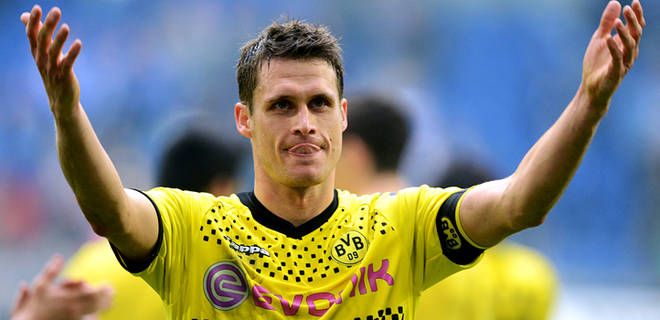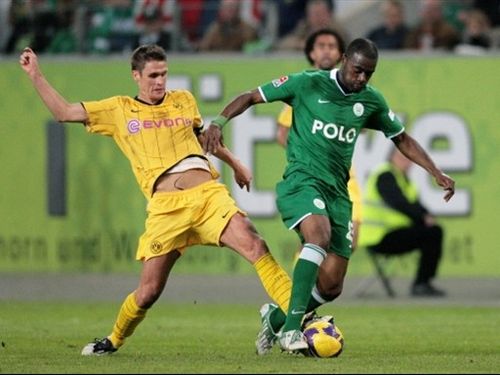
Legends of Club Football: Sebastian Kehl
Usually, a player is termed as a club legend if he is a product of the youth academy or one who has played out his entire career for one club right from the youth teams to first team action. But on a personal note, a club legend is someone who gives his all to the club no matter what situation the club is in. One who doesn’t care if they are winning 5-0 or are losing 5-0 but will still strive for the betterment of the team and who will remain with the club through its hardships and guide it through its successful ventures. That, for me, is a club legend and that man for Borussia Dortmund is Sebastian Kehl.

Born in Fulda, Hesse, in 1980, Kehl started his youth career at Hannover 96 at the age of sixteen, at a time when the club were competing in the 2.Bundesliga (the second division). He made his debut in 1998 and made thirty-two league appearances before his transfer to SC Freiburg in the Bundesliga. In his first season, Kehl made twenty-five appearances as a sweeper as Freiburg finished sixth and qualified for the UEFA Cup.
In the summer of 2001, Kehl had already agreed basic terms with Bayern Munich, and even accepted an advance payment. But the money was returned in November as Dortmund approached Kehl. Bayern were angry and threatened legal action but the €3.2 million deal with Dortmund was allowed to stand, and the rest is history. Kehl started all but one of Dortmund’s league games in that period and was rewarded with his first Bundesliga winner’s medal at the end of the season, though he was cup-tied for Borussia’s UEFA Cup final defeat to Feyenoord.
In his second campaign with Dortmund, Kehl made twenty-four league appearances and started every game as the club reached the second group stage of the Champions League, but Dortmund finished the season seventeen points behind champions Bayern in third. Things worsened the following year as Die Borussen came in sixth in the league, crashed out of the European competition at the qualifying stage and only made it to the second round of the UEFA Cup. In 2005, they were on the verge of bankruptcy where-as the Bavarians were cruising to title after title. Suddenly the decision to snub FC Hollywood started to look a bit stupid. But despite the club struggling and many transfer opportunities presenting themselves, Kehl stayed at Dortmund. He was a mainstay in the Dortmund line-up, and his combination of tough tackling, an eye for the killer pass and a surprisingly bullet left foot had earned him a place in the Germany squads for the 2002 World Cup and Euro 2004. He started more than sixty league games over the next two seasons as Dortmund struggled to consecutive seventh-place finishes in 2005 and 2006 that brought little prize money to boost their financial status.

Dortmund’s period of transition coincided with their star man being injured as Kehl struggled to conjure up fifty starts in over three seasons. In 2008, new coach Jurgen Klopp named Kehl as the club captain despite his well-documented injury issues. Kehl’s bad luck with injuries continued as he suffered an injury ridden two years, making only 13 league appearances in the 2009-10 and 2010-11 seasons as Borussia Dortmund won the Bundesliga for the first time in 9 years. Nuri Sahin and Sven Bender were the new dynamic midfield duo and Kehl was suddenly deemed slow and surplus by the critics. But Dortmund persevered with their club captain.
Next season, Sahin was snapped up by Real Madrid, and Kehl managed to get his body to play ball again. Kehl was back with a bang by playing more minutes than both Bender and Sahin’s replacement, Ilkay Gundogan, as he captained Dortmund to the defence of their league title and also to the final of the DFB Pokal, where they dismantled their eternal rivals Bayern 5-2 in Berlin. His career had come a full circle considering the fact that after the glory of winning the Bundesliga in his first season at BvB to the club being on the verge of bankruptcy, his own injury concerns and then coming back from it all, he led the team to an unprecedented double in the club’s history.
Kehl has played through pain this season, coming on as a substitute against Shakhtar despite having a broken rib and also playing with a mask against Real Madrid, racking up twenty-six appearances in all competitions. Dortmund have failed to retain either of the Bundesliga or DFB Pokal titles this time but their Champions League dream is still alive, where the club he snubbed all those years ago awaits in an exciting all-German final.
And if he ever feels as though he should have got more out of his career, he would do well to look back at his own words from 2003: “What I’m working towards is that people should say ‘You can rely on Kehl. He always performs, and he always gets stuck in for the team.’”
And now, after a fairly successful career, no one can doubt that he has always given it his all.